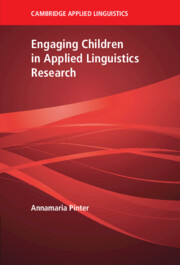Book contents
- Engaging Children in Applied Linguistics Research
- The Cambridge Applied Linguistics Series
- Engaging Children in Applied Linguistics Research
- Copyright page
- Contents
- Figures
- Tables
- Series Editors’ Preface
- 1 Setting the Scene
- 2 From Traditional to Contemporary Conceptions of Childhood
- 3 Voice, Agency and Participation
- 4 Child-Centredness and Democratic School Structures
- 5 Children’s Roles and Status in Applied Linguistics Research
- 6 Filling the Gap: What Kind of Research Is Needed?
- 7 Ethical Issues and Dilemmas
- 8 Towards Children’s Active Engagement in Applied Linguistics Research
- Appendix of Studies
- References
- Index
7 - Ethical Issues and Dilemmas
Published online by Cambridge University Press: 05 October 2023
- Engaging Children in Applied Linguistics Research
- The Cambridge Applied Linguistics Series
- Engaging Children in Applied Linguistics Research
- Copyright page
- Contents
- Figures
- Tables
- Series Editors’ Preface
- 1 Setting the Scene
- 2 From Traditional to Contemporary Conceptions of Childhood
- 3 Voice, Agency and Participation
- 4 Child-Centredness and Democratic School Structures
- 5 Children’s Roles and Status in Applied Linguistics Research
- 6 Filling the Gap: What Kind of Research Is Needed?
- 7 Ethical Issues and Dilemmas
- 8 Towards Children’s Active Engagement in Applied Linguistics Research
- Appendix of Studies
- References
- Index
Summary
Chapter 7 addresses key global and local (macro and micro) ethical dilemmas when working with children, particularly when they are in active roles. It outlines generic ethical issues relevant to research with under-18s and addresses ethical issues when moving from research ‘on’ and ‘about’ to research ‘with’ and ‘by’ children. As well as addressing the origins and main dilemmas of child-focussed ethics, the chapter evaluates several existing international ethics guidelines for research involving child participants that are potentially relevant for applied linguistics, drawing out challenges, opportunities and tensions. It revisits the key messages of the UN Convention on the Rights of the Child as a point of reference for ethical research practice, addresses the process of securing child consent or assent and discusses good practice when securing permissions from other stakeholders. Ethical issues, specifically when working with multilingual children and families, are covered as well as how ethical guidelines must be sensitive to cultural, social and contextual circumstances, making reference to issues in different contexts, including those in the Global South.
Keywords
- Type
- Chapter
- Information
- Engaging Children in Applied Linguistics Research , pp. 173 - 200Publisher: Cambridge University PressPrint publication year: 2023

